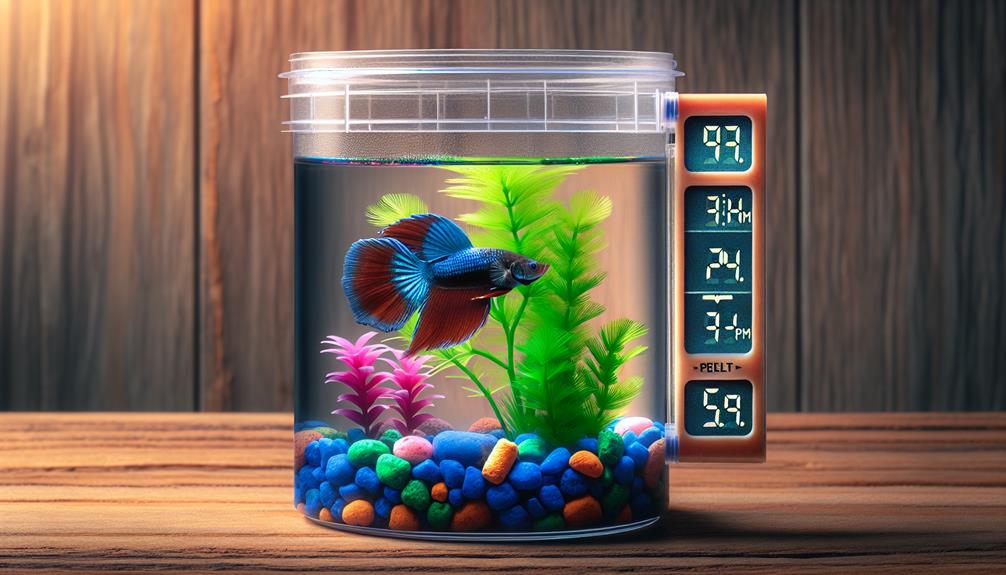What Is the Ideal Feeding Schedule for Betta Fish?

Have you ever wondered if feeding your betta fish multiple small meals throughout the day is better than a single large feeding? The ideal feeding schedule for betta fish is a topic that often sparks debate among fish enthusiasts.
Understanding how often and how much to feed your betta is vital for their health and well-being. But before you make any changes to your current feeding routine, there are several factors to take into account that can have a major impact on your betta's overall health.
Frequency of Feeding Betta Fish
To maintain the health and well-being of your Betta fish, it's recommended to feed them small portions 2-3 times a day. Understanding the feeding habits of Betta fish is important for their overall health. Betta fish are carnivorous and have high protein requirements. Their nutritional needs are primarily met through protein-rich foods like brine shrimp, bloodworms, and high-quality Betta pellets. Feeding them multiple small meals throughout the day replicates their natural feeding behavior in the wild, where they forage for food continuously.
Overfeeding can lead to obesity and various health issues in Betta fish. It's essential to provide them with the right balance of nutrients to support their growth and immune system. By feeding them small portions 2-3 times a day, you guarantee that they receive adequate nutrition without overloading their digestive system. Observing your Betta fish's feeding habits and adjusting the feeding schedule accordingly can help maintain their best health and vitality. Remember, a well-fed Betta fish is a happy and healthy Betta fish.
Recommended Betta Fish Diet
When considering the recommended diet for Betta fish, prioritize incorporating protein-rich foods such as brine shrimp, bloodworms, and high-quality Betta pellets. Betta fish nutrition plays a critical role in maintaining the health and vitality of these vibrant creatures. Protein is essential for Betta fish as it helps in muscle development, growth, and overall metabolic functions. Incorporating a variety of protein sources guarantees a well-rounded diet that meets their nutritional needs.
Betta fish are carnivorous by nature, so their feeding habits should revolve around protein-rich foods. Brine shrimp and bloodworms are excellent choices as they mimic the Betta's natural diet in the wild. High-quality Betta pellets fortified with essential vitamins and minerals are convenient options that provide a balanced diet. It's important to avoid overfeeding to prevent obesity and other health issues.
Understanding the dietary requirements of Betta fish is key to promoting their well-being and longevity. By offering a diverse diet rich in proteins, you can ensure your Betta fish thrives in its aquatic environment.
Tips for Feeding Betta Fish
For excellent health and well-being of your Betta fish, make sure to vary their diet with a mix of protein-rich foods and high-quality pellets. When feeding your Betta fish, consider using feeding techniques that cater to their natural feeding preferences. Betta fish are carnivorous and thrive on a diet rich in protein. Live or frozen foods such as bloodworms, brine shrimp, and daphnia are excellent choices to mimic their natural diet. Additionally, high-quality Betta pellets specifically formulated for Betta fish should also be included in their diet to make sure they receive all the necessary nutrients.
To cater to your Betta fish's feeding preferences, consider feeding them small amounts multiple times a day rather than one large meal. This feeding technique helps prevent overfeeding and ensures your Betta fish can consume their food comfortably without leaving behind uneaten food particles that can deteriorate water quality. By understanding their feeding preferences and utilizing appropriate feeding techniques, you can provide your Betta fish with a balanced and nutritious diet essential for their overall health and vitality.
Avoid Overfeeding Betta Fish
Properly controlling the amount of food you give your Betta fish is important to prevent overfeeding and maintain their health. Betta fish have small stomachs, so portion control is critical. Overfeeding can lead to obesity, bloating, constipation, and even swim bladder issues. These conditions can be detrimental to your Betta's health and may require veterinary intervention.
To avoid overfeeding, observe your Betta's feeding behavior. If they leave food uneaten or show disinterest, you may be overfeeding. Ideally, feed your Betta small amounts of food 2-3 times a day, an amount they can consume within 2 minutes. Pellets or flakes specifically designed for Betta fish are recommended due to their balanced nutrition. Remember, uneaten food can pollute the tank, affecting water quality.
Adjusting Feeding Schedule for Bettas
To optimize the health of your Betta fish, it's important to fine-tune their feeding schedule based on their individual needs and behaviors. Feeding consistency plays a vital role in maintaining the well-being of your Betta. These fish thrive on routine; hence, feeding them at the same times each day can help reduce stress and promote overall health.
Observing your Betta's feeding behavior is key in adjusting their meal timing. Some Bettas are more active and keen to eat in the morning, while others may prefer to feed in the evening. By understanding your fish's feeding habits, you can tailor their feeding schedule to better suit their natural tendencies.
Additionally, monitoring how much your Betta consumes during each feeding session can help prevent overfeeding and related health issues. By making small adjustments based on your Betta's feeding behavior and preferences, you can create an ideal feeding schedule that promotes their well-being and happiness.
Conclusion
To sum up, the ideal feeding schedule for betta fish involves feeding them small amounts 2-3 times a day. Providing a balanced diet of high-quality pellets, live or frozen foods, and occasional treats will help keep your bettas healthy and thriving.
Remember to monitor their behavior and adjust their feeding schedule as needed. By following these guidelines and avoiding overfeeding, you can make sure that your betta fish is well-nourished and happy in their environment.
